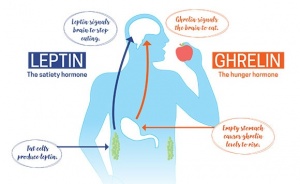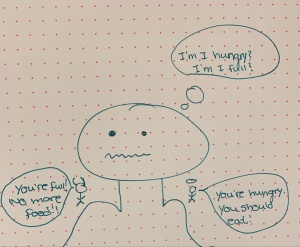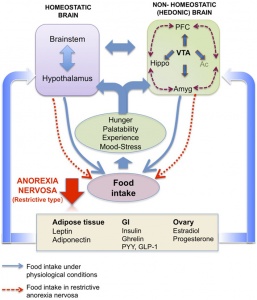
Am I hungry or not?
Leptin is a hormone that decreases your appetite while ghrelin increases it. These hormones aid in determining an individuals weight. However, when there is a malfunction in the signaling pathways an individual can experience weight gain/loss.

Drawing by Hannah Paulson
For people with eating disorders, the decision of what to eat is a complicated snarl of anxiety and guilt. And it’s not much less complicated for people without eating disorders. Our appetites, for what and how much we eat, are regulated by a complex array of hormones, hunger, and desire. When these systems are working properly, everything is great. We eat what we need and want, more or less. Our weight is appropriate for our genes and body type. Our diet is varied and tasty.

Leptin
As in any complex system, however, things can go wrong. Research has shown us that eating disorder sufferers have problems regulating feelings of hunger and satiety that can perpetuate and perhaps even contribute to the onset of illness. Several key hormones and brain processes have been identified that may be malfunctioning in people with eating disorders. Leptin and ghrelin, discussed below, also interact with a variety of other hunger and satiety signals to help keep our bodies fueled properly.
Leptin is a hormone produced by fat cells that signals satiety. Researchers at Rockefeller University discovered the leptin gene almost 20 years ago, and researchers soon showed that leptin is one of the many reasons why diets don’t work. As body fat stores go down, so do leptin levels. Lower leptin levels mean that it takes longer to feel full after eating, which serves to bring the body back to its original weight.
Since leptin is a key component of appetite and body weight regulation, scientists suspected that leptin might be involved in eating disorders. Researchers measured leptin levels in 67 women with eating disorders, compared to 25 healthy women. As expected, leptin levels were significantly elevated in the women with binge eating disorder compared to healthy women, but they were significantly lowered in women with anorexia or bulimia.
Normally, high levels of leptin are associated with lower levels of endocannabinoids, brain chemicals that, among other things, regulate appetite. Low levels of endocannabinoids should make a person feel less hungry. This isn’t the case in people with binge eating disorder; their elevated leptin levels are actually associated with high levels of endocannabinoids, which could help promote further binge eating.
In bulimia, leptin levels appeared somewhat lower than expected, and lower leptin levels were associated with more frequent binge eating. A later study found that low leptin levels in women with bulimia were also associated with more chronic, severe illness.
When researchers compared leptin levels in women with anorexia to women who had low weights for other reasons, they found that leptin was significantly higher in the women with anorexia. This blunted leptin response could help explain why people with anorexia are hyperactive and can continue starving themselves for long periods of time. They are hungry, yes, but not as hungry as they should be.
Ghrelin
Ghrelin is secreted by the stomach and acts opposite to leptin. Whereas high levels of leptin help trigger satiety, high levels of ghrelin help trigger hunger. Ghrelin levels typically rise before a meal and decrease afterwards. The hormone is thought to work in part by helping to stimulate the brain’s reward system to encourage eating.
Scientists found that, in women with binge eating disorder, ghrelin levels were lower than in women with similar BMIs. Other researchers have found similar results indicating that decisions about eating aren’t dictated just by hunger and fullness, but by other emotions as well.
When researchers measured ghrelin in women with bulimia, they found that levels of this hormone didn’t decrease as much as it did in control women. Since women with bulimia don’t feel as full after a meal, they may be more likely to binge or overeat. In anorexia, ghrelin levels are elevated, as expected with someone who is starving. During the refeeding process, however, ghrelin levels drop dramatically, which could help explain why many people with anorexia struggle to put on weight because their hunger signals aren’t working properly.